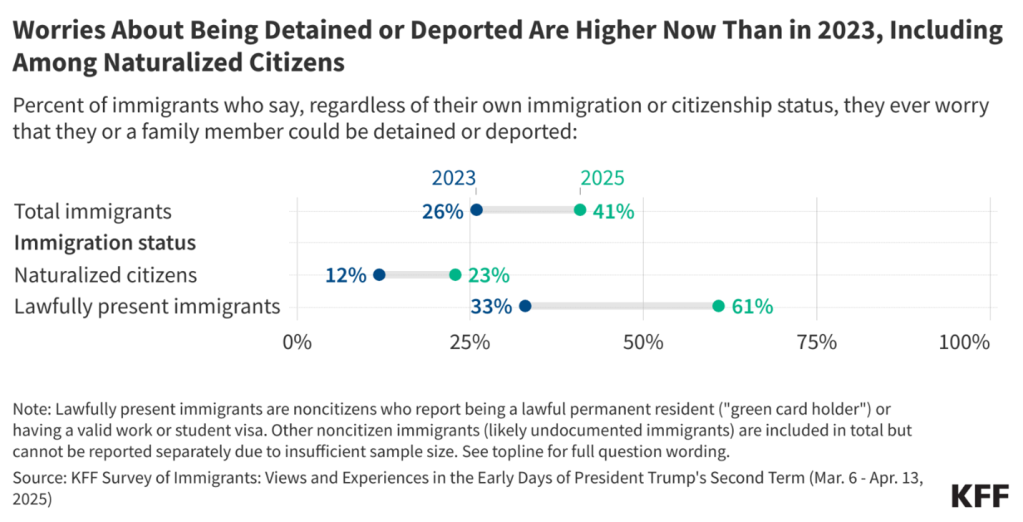A new KFF poll of immigrants finds that 6 in 10 lawfully existing immigrants say they stress over the possibility that they or a relative could be apprehended or deported, contributing to feelings of raised anxiety, anxiousness, and other health problems.
The enhanced fears come versus a background of even more limiting government migration policies and boosted enforcement activities and are among the most significant takeaways from the new KFF study of immigrants’ views and experiences during the early days of Head of state Trump’s second term.
The study improves the 2023 KFF/LA Times Survey of Immigrants , and a KFF survey of immigrants in 2024 throughout the governmental election cycle. A separate brand-new friend KFF report based on focus group conversations with likely undocumented immigrants and their households offers a home window into how the present immigration plan landscape is affecting their and their children’s daily lives and wellness and well-being.
The brand-new poll shows that immigrants’ worries about detention or expulsion have climbed sharply considering that 2023, also amongst lawfully existing immigrants and naturalized citizens. Four in ten immigrants general (41 %) currently claim they fret about the possibility that they or a relative might be apprehended or deported, up 15 portion factors from 2023 (26 %).

Such worries have affected immigrants’ wellness and wellness, with one-third of immigrants total stating they have experienced worsening health conditions, enhanced stress and stress and anxiety, or problems consuming or resting since January as a result of worries regarding their or a member of the family’s migration condition. The share increases to 41 % among lawfully existing immigrants.
Other key takeaways include:
- Concerning one-third of immigrants say they have actually seen or listened to reports of ICE (Immigration and Traditions Enforcement) presence in their community.
- Concerning one in seven (13 %) immigrants on the whole, consisting of one in five legally present immigrants claim they or a relative have actually limited their involvement in at least one daily activity like going to an area occasion, work, or seeking healthcare due to concerns about accentuating someone’s migration status.
- 4 in 10 immigrants state they really feel “less risk-free” given that President Trump took office, including substantial shares of both lawfully existing immigrants (44 %) and naturalized people (34 %). Many immigrants who determine as Democrats or lean in this way (57 %) claim they really feel less secure, however half of Republican and Republican-leaning immigrants (52 %) claim they feel much safer since Trump took workplace.
- Concerning four in 10 immigrants overall (43 %) expect their monetary circumstance to intensify in the coming year, consisting of a bulk of Democrats (57 %). Republican immigrants are more positive– four in 10 anticipate their finances to improve while three in 10 expect them to get worse.
Political sights of immigrants
As amongst the public overall, immigrants’ sights of President Trump and his plans are driven by partisanship. About two-thirds of immigrants disapprove of just how Head of state Trump is handling his work, and a comparable share state things in the U.S. have obtained off on the wrong track. However bulks of Republican immigrants claim they approve (75 %) of the head of state’s work efficiency which things in the united state are going in the appropriate direction (71 %).
President Trump’s worst approval score among immigrants is on his handling of inflation (75 % refuse), and majorities also his performance on foreign policy (66 %), and immigration (62 %). A huge bulk oppose the management’s efforts to finish birthright citizenship (79 %). Republican immigrants are a lot more accepting of President Trump’s efficiency and his policies, yet 41 % of Republican immigrants his handling of rising cost of living, and this group is divided on his efforts to end birthright citizenship (52 % accept, 48 % reject).
Emphasis group searchings for
In the companion record, based on four emphasis groups KFF carried out in March 2025 with 29 Hispanic grownups that were likely undocumented or coping with a likely undocumented relative, almost all individuals claimed that they were experiencing higher degrees of fear and uncertainty due to changing immigration plans, in addition to monetary concerns due to the existing state of the economy.
Individuals described exactly how anxieties are adversely impacting work in addition to their family members’s daily lives and routines. Some emphasis team individuals said they have ended up being increasingly frightened of mosting likely to work and/or that they have observed less workers turning up at their workplaces as a result of immigration-related worries. Many said they were restricting their time outside the home and staying clear of a range of activities, such as driving, traveling, and participating in community and leisure activities, including participating in church or occasions.
Worries likewise have actually taken a toll on the wellness and wellness of focus group individuals and their children, most of whom are united state residents. Individuals explained struggling with sleeping disorders, loss of appetite, and signs such as belly troubles and migraine headaches as a result of be afraid and tension.
Methodology :
Designed and examined by public opinion scientists at KFF, the survey was carried out March 6 -April 13, 2025, online and by telephone amongst a nationally representative example of 511 U.S. immigrants in English, Spanish, Chinese, Korean, and Vietnamese. The margin of sampling error is plus or minus 7 percent factors for the complete sample. For outcomes based upon subgroups, the margin of tasting mistake might be higher. Focus team interviews with Hispanic immigrant grownups were carried out in Spanish with individuals hired separately from the study. The 4 groups attracted participants from The golden state, Texas, New Jersey and New York City, and components of the Midwest (Kansas, Missouri, North Carolina, Nebraska). Full methodological information are readily available at kff.org.